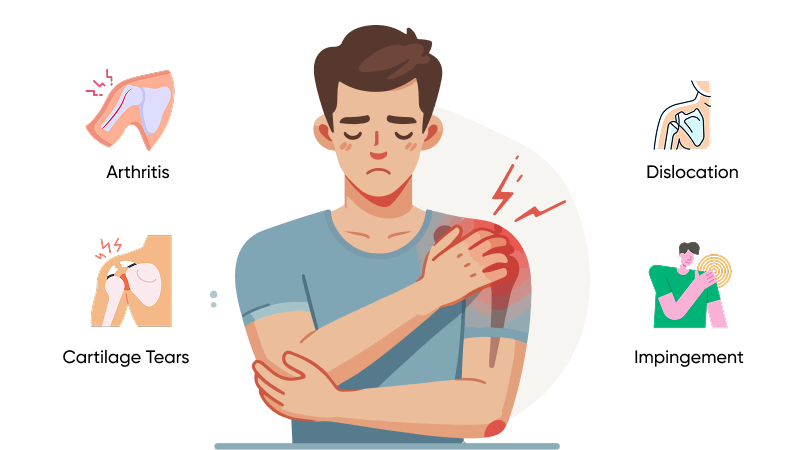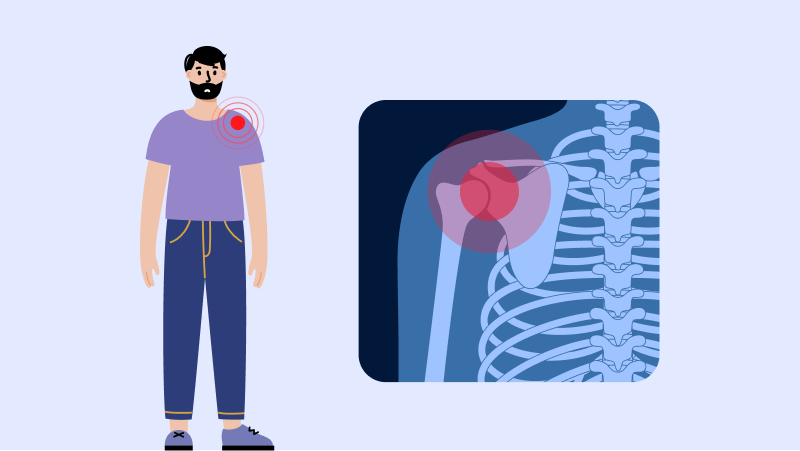The shoulder’s range allows for wide functional movement, yet this same mobility makes it vulnerable. Once discomfort sets in, tasks involving elevation or pressure may feel restricted. In those early moments, many ask: What doctor should I see for shoulder pain?
Shoulder pain can stem from several sources—bone, muscle, ligament, nerve, or joint—and each tells a different story. The right expert listens, examines, and then chooses a path tailored to the root cause, not just the symptom. Treatment decisions shift depending on the nature of the damage, the patient’s lifestyle, and how movement has been affected over time.
Causes of Shoulder Pain

To know whom to approach, it helps to understand why the pain has shown up in the first place.
Arthritis
Wear and tear often strike the shoulder over time. Osteoarthritis, the most common form, gradually erodes the protective cartilage for joint movement. With time, daily actions like combing hair or reaching behind become stiff or painful. Inflammatory forms like rheumatoid arthritis add swelling and warmth to the picture.
Dislocation
When the upper arm bone pops out of the shoulder socket, it creates intense, immediate pain. After such a dislocation, the joint may become loose and prone to slipping again, particularly during sports or heavy lifting. Recurring dislocations demand more than rest—they need stabilisation and guided recovery.
Cartilage Tears
Cartilage, especially the labrum, forms the shoulder’s soft rim. It supports movement and prevents slippage. Tears often occur after accidents, repeated motion, or lifting something heavy. A dull ache deep within the joint, clicking sounds, or weakness during activity can all point to this condition.
Impingement
When shoulder muscles or tendons get pinched between bones, it’s called impingement. Repeated overhead actions can make tendons inflamed or irritated. This is common in swimmers, painters, or those spending hours reaching above shoulder height. Pain may spike when lifting the arm or sleeping on one side.
What Doctor should I see for Shoulder Pain?
Now comes the pivotal question: what doctor to see for shoulder pain when there are many types, layers, and causes?
The answer depends on the pattern, duration, and severity of the pain. In cases of injury or deformity, orthopaedic consultations are common. But for persistent aches, tightness, or referred pain without an obvious accident, it’s often best to consult a specialist in pain medicine.
Pain management specialists focus on identifying the root cause—whether muscular, neurological, or postural. Their role extends into non-surgical treatment plans built to restore comfort, strength, and range of motion without aggressive procedures.
Patients often find clarity at a reputed pain management clinic in Chennai, such as Epione, where interdisciplinary evaluations connect the dots between posture, movement, occupation, and injury history.
When to See a Doctor
While some shoulder soreness fades after a few days, certain signs shouldn’t be overlooked:
- Pain that lasts longer than a week
- Difficulty lifting or rotating the arm
- Tingling, numbness, or weakness
- Shoulder looking deformed or out of place
- Pain that worsens at night or disrupts sleep
These symptoms are the body’s signals that it needs more than rest. Waiting too long can turn a minor strain into a long-term restriction.
How Is Shoulder Pain Diagnosed?

At Epione Chennai, diagnosis begins long before machines come into play. Specialists first conduct a detailed discussion covering work habits, physical activity, lifestyle, and medical history. The next step involves precise physical testing—measuring strength, movement angles, and discomfort during specific actions.
If needed, advanced imaging like ultrasound or MRI offers a closer look at muscles, tendons, or cartilage without radiation exposure. Unlike general clinics, the focus at Epione is on interpreting these results in the context of real-world movement, not just isolated scans.
Once the root cause is confirmed, the care team builds a custom plan for shoulder pain treatment in Chennai. It might include dry needling for muscle tension, physiotherapy for mobility, nerve modulation for radiating pain, or posture correction for long-term relief. All this is done without surgical intervention, focusing on rebalancing rather than removal.
For those seeking the best doctor for shoulder pain, expertise must go hand in hand with precision and patience. At Epione, consultations are as much about listening as examining.
Pain in the shoulder can be linked to joint misalignment, nerve interference, or chronic strain on surrounding muscles. It often reflects an imbalance that disrupts how the upper body supports and stabilises itself. Asking what doctor should I see for shoulder pain is not a sign of weakness—it’s the first move toward lasting relief.
When care is based on accurate diagnosis, structured therapy, and personalised attention, shoulders heal not by chance, but by design. For anyone unsure where to begin, a consultation with trusted pain management specialists in Chennai offers a path that respects the body’s signals and responds with clarity, not guesswork.

